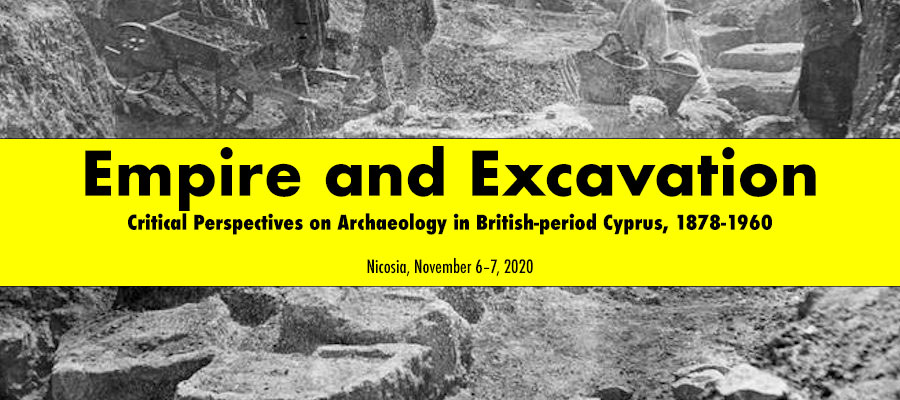Empire and Excavation: Critical Perspectives on Archaeology in British-period Cyprus, 1878-1960, Nicosia, November 6–7, 2020
In 2001, the British Museum published the proceedings of a conference held in 1999 entitled Cyprus in the Nineteenth Century AD. Fact, Fancy and Fiction. Edited by Veronica Tatton-Brown, the volume represented a watershed in the historiography of collecting and excavating antiquities on the island. Since that time, there have been significant advances in the history of Cypriot archaeology, but more especially in critical approaches to the historiography of archaeology as a whole. These approaches extend beyond traditional narratives of discoveries and intellectual trends and now encompass a diverse range of social, economic and cultural analyses within a comparative global framework (and especially in the framework of post-colonial thinking). The bibliography is now considerable, but among the key titles pioneering a range of new approaches can be listed: Tracing Archaeology's Past: The Historiography of Archaeology (A. Christenson, 1989); Rediscovering Our Past: Essays on the History of American Archaeology (ed. J. Reyman, 1992); Archives, Ancestors, Practices: Archaeology in the Light of its History (eds. N. Schlanger and J. Nordladh, 2008); Histories of Archaeology: A Reader in the History of Archaeology (ed. T. Murray, 2008); Hidden Hands: Egyptian Workforces in Petrie Excavation Archives, 1880-1924 (S. Quirke, 2010); Scramble for the past. A story of archaeology in the Ottoman Empire, 1753-1914 (eds. Z. Bahrani, Z. Çelik and E. Eldem, 2011); World Antiquarianism: Comparative Perspectives (ed. A. Schnapp, 2013); From Antiquarian to Archaeologist. The History and Philosophy of Archaeology (T. Murray, 2014); About Antiquities. Politics of Archaeology in the Ottoman Empire (Z. Çelik, 2016); Ancient Monuments and Modern Identities. A Critical History of Archaeology in 19th and 20th Century Greece (eds. P. Cartledge and S. Voutsaki, 2017); Antiquarianisms: Contact, Conflict, Comparison (eds. B. Anderson and F. Rojas, 2017).
In Cyprus too, there has been growing interest in previously neglected or unpublished fieldwork beyond purely archaeological discoveries, as well as in archival sources recording the collection and excavation of antiquities, both in the context of broader political and socio-economic aspects of the subject (especially imperialism and nationalism) and the methods and motivations of individual excavators and scholars. These go beyond the well-known public-facing histories of key figures, again reflecting the broader discipline.
At the same time, numerous aspects of archaeology in this period are under-explored and significant archival resources remain under-exploited, while the subject would also benefit from comparative approaches with other regions, such as the Mandated territories of the Middle East in the 20th century AD. Methodologies or genres such as microhistory and object biography offer new perspectives on historical approaches and subjects, especially for uncovering hidden histories of underrepresented groups (such as women, non-elite individuals such as workers, and local agents more generally).
The sixtieth anniversary of the Republic of Cyprus provides an excellent opportunity to revisit the theme of the original conference with a workshop that will build on the past generation of scholarship while expanding the coverage to the entire British colonial period (1878-1960) and introducing the latest trends in the historiography of archaeology. It is hoped that the proceedings with be published in a peer-reviewed volume in 2021.
Suggested themes include, but are not restricted to:
- How consciously or purposively political was archaeology in Cyprus in the British colonial period? How do we assess the fieldwork of European and American excavators working on the island at the same time and in the context of other imperial/colonial activity in the region?
- What knowledge of archaeology can be gained from little-known or overlooked archival sources such as photography and film, and from travel accounts and memoirs?
- The role of underrepresented groups in Cypriot archaeology (social, ethnic, gender).
- The key role of local Cypriots – from archaeological field workers and villagers to collectors and scholars – in the excavation and presentation of their past; conversely, the (mis)representation of local agency by archaeologists and scholars, then and now.
- The social and economic contexts and histories of excavation and collection, including unlicensed digging/ ‘looting’ and unlicensed export within a longer-term perspective.
- The diaspora of Cypriot antiquities, the mechanisms underpinning the formation of foreign collections (e.g. the antiquities trade), and museum strategies of interpretation and display in historical context.
- Critical interpretations of the long-term excavation histories of individual archaeological sites and regions.
- The ‘meta-historiography’ of archaeology: how archaeologists and historians have represented the work of earlier fieldworkers and scholars in their publications.
- The cultural and political use of archaeological finds, including their recruitment to colonial and nationalistic ideologies in the British colonial period.
- The mis/representation of the history of archaeology to general audiences: its impact on public understanding of excavation, and its uses for public engagement and community building.
Comparative regional studies focused on the Eastern Mediterranean and Middle East are particularly welcomed. Likewise, we encourage papers which cross disciplinary boundaries and help to frame the history of Cypriot archaeology in a more holistic manner with contributions from history, anthropology, heritage studies and other related areas.
Jointly organised by the British Museum and the Cyprus American Archaeological Research Institute, in association with the Council for British Research in the Levant
Conference organizers
Dr Thomas Kiely, British Museum
Dr Lindy Crewe, CAARI
Anna Reeve, University of Leeds
